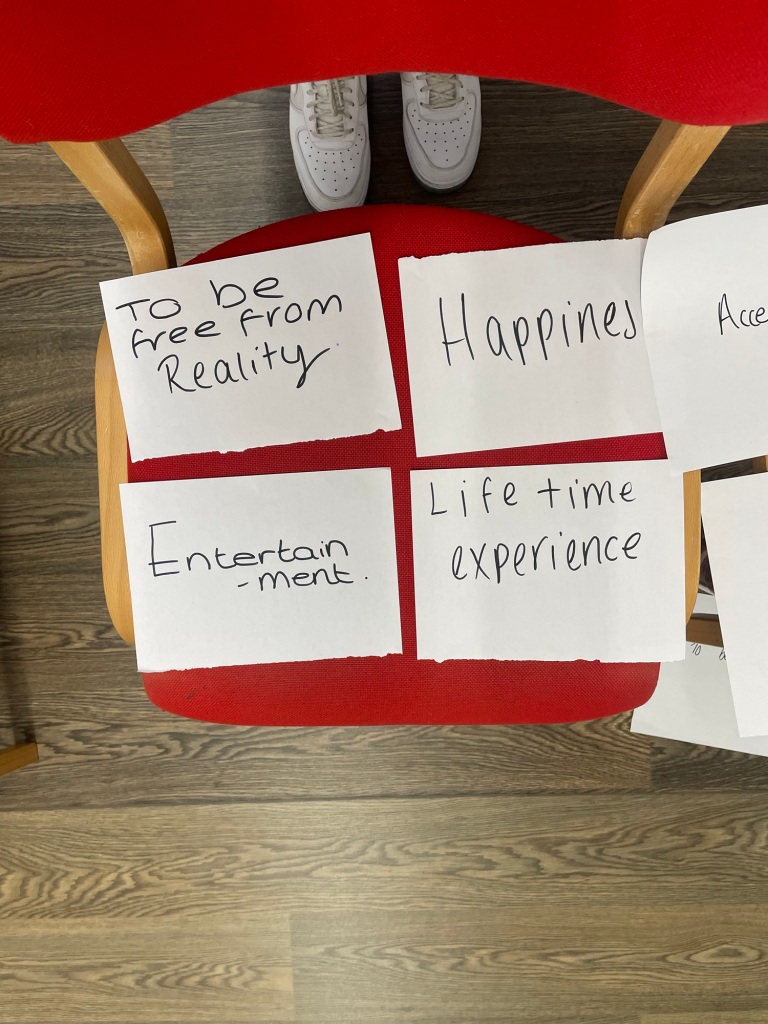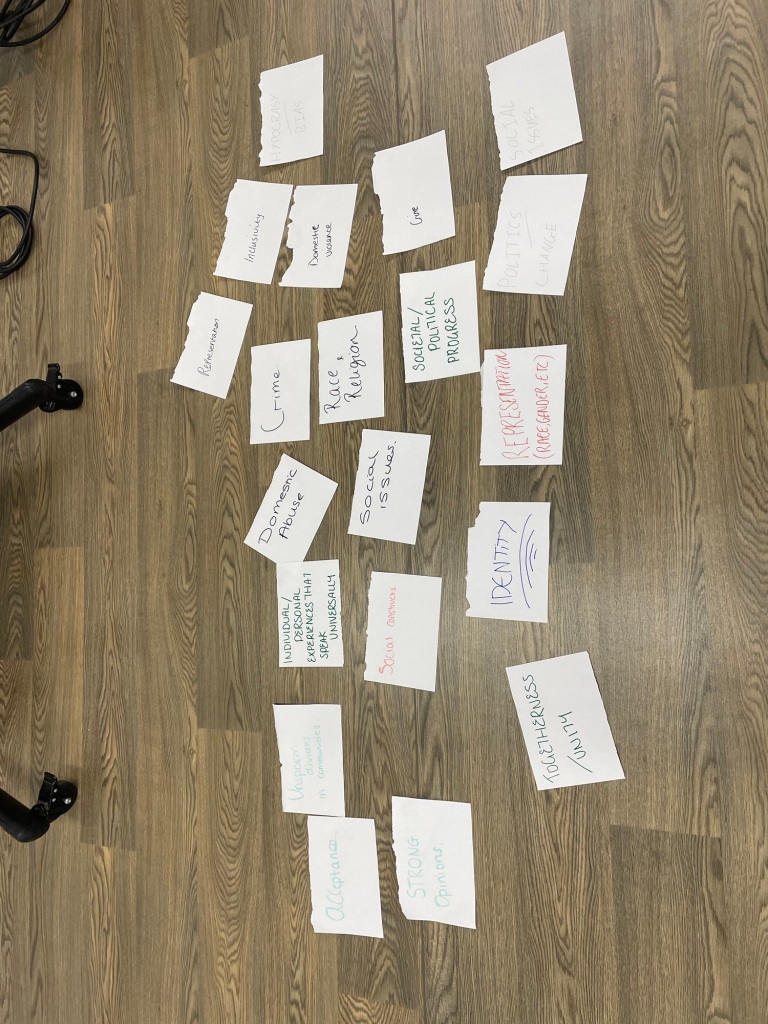

PRACTITIONER


Theatres and Venues: What to consider when programming a production?
Deals:
Re-write script between Ali and Dieter:
Dieter pushes cereal around the bowl with a spoon.
ALI: What are you doing with your cereal? Why aren’t you eating it? Why won’t you look at me? Whatever your thinking Dieter, spit it out.
Dieter puts down the spoon, stares blankly at the table.
DIETER: Do you love me? I mean really love me? I feel like you don’t and it’s worrying me.
Taken by surprise, Ali looks out the window.
ALI: I’m not sure. It’s been like that for a while now. My feelings have changed.
DIETER: What do you mean you’re not sure? Answer honestly! Do you love me? You clearly don’t if your feelings have changed Ali.
Subtext
Subtext Exercise:
Write a scene which includes the following:
Characters are not allowed to discuss the shared knowledge. They can talk about anything else e.g. the weather, recent visitor, game of chess, prison staff, a mouse in the cell.
SCRIPT:
Dave moves a king across the board.
DAVE: Take that! See told you I could beat you. I’m a legend at this game.
MIKE: Alright calm down. Don’t get too excited.
DAVE: Come on mate, what’s wrong with you? You seem miserable.
Mike stands up and heads towards the window.
MIKE: I’m sick of being shacked up in this rotten cell Dave. I mean look at the sun outside and we’re stuck in here.
DAVE: We get used to it Mike. Is the Mrs coming to visit?
MIKE: Later she is. I hate her seeing me like this mate. I’d rather be enjoying a nice holiday with her.
Dave stands up and heads over to Mike, he begins to wind Mike up for a laugh.
DAVE: Yeah well, I’m sure she doesn’t mind blokes dressed in orange, if you get what I mean.
MIKE: Shut up Dave. It ain’t funny.
DAVE: I’m sorry mate.
MIKE: I really want to go outside, have a nice game of basketball with you all. Get the lads together.
DAVE: Well I want that too but we can’t go outside for another few hours and it will be dark by then. Come on let’s have another round before dinner.
MIKE: I think I’m good for now mate.
Dave heads back to the table, Mike sighs loudly and mumbles under his breath.
MIKE: Not long now Mike, not long.
Alternative and community theatre through the 60’s and 70’s:
Rise of Identity Politics:
In Yer Face Theatre:
Edward Bond:
The Gap
“Is the space between the material world and the self” and it is imperative that we create human value in the void.
Accident Time
Bod mixes the slowing down of time in an accident, with the calm at the centre of a cyclone when everything is thrown up around you. As a result, there is a precision of perception. Bond places the audience in accident-time, inside a theatrical cyclone which is dramatic action, echoing the turbulence and accidents of life.
Balancing Act
Cathexis
The Centre
Ways to Fundraise:
Judy’s Project with Dance X Change (now known as FABRIC):
SIX WORDS ABOUT CONFETTI CANON:
NOTES ABOUT OBJECT:
WHAT IS CHARACTER?
TYPES OF CHARACTERS:
CHARACTERS:
QUESTIONS ABOUT CHARACTER :
THINK ABOUT BEING THE PROTAGONIST: (SCENE BY SCENE BREAKDOWN.)
DISCUSSION AT BEGINNING OF SESSION ABOUT THOUGHTS OF RESPONSABILITY OF BEING AN ARTIST:
‘ALL THAT IS BANNED IS DESIRED’ – A World Conference on Artistic Freedom of Expression, 2012.
THOUGHTS ON QUOTE:
STYLES OF POLITICAL THEATRE, WITH EXAMPLES:
WHY WE THINK PEOPLE VISIT THE THEATRE
TOPICS WE SAID THEATRE MAKERS COULD SPEAK ABOUT:
THINGS WE THINK WE WOULD BE NERVOUS ABOUT ON STAGE:
Bezhti & Behud Timeline:
PLAYS THAT HAVE CAUSED CONTROVERSY:
Scriptwriting Essentials:
A
B
BBC Writers. (2024). Scriptwriting Essentials. [Online]. BBC Writers. Available at: https://www.bbc.co.uk/writers/resources/scriptwriting-essentials/ [Accessed 30 January 2024].
C
D
E
F
G
H
I
J
K
L
M
N
O
P
Q
R
S
T
U
V
W
X
Y
Z
What is the difference between a story and a play? For this we looked at Little Red Riding Hood.
Story – Listening, Descriptive, See it in your own mind, Interpret it individually, Imagining it individually, Events.
Play – Engage with and play with, See it happening in front of you, watch, Details filled out for you, Characters, Picture what was just shown.
What is the difference between play and film? For this we looked at An Inspector Calls.
Play – Let’s us figure it out.
Film – Foreshadowing (factory, streets, cars, mansion), Images, Can have sides and close ups.
Features of a play:
Playwright:
What is a playwright? What do we think it means?
Someone who writes a play.
Freewriting task:
Leading topics for each episode!
Topic: write about anything.
I walked to shop on my way from home school. I was approached by this man, never seen him before. He was tall, intimidating and reminded me of my dad. He asked me some questions, wasn’t sure on how to answer them. He offered to buy me sweets but I kindly refused. It was like he was planning something, but I wasn’t sure what. Next thing I know, he’s sat down beside me crying, I sat next to him and he explained. He wanted a chat.
Topic: a lyric from a favourite song or a favourite quote.
My favourite quote is ‘ohana’ because it’s all about family. Family is the most important thing in the world, you n have one to help you survive, have one to help guide you, have one that loves you and one that cares for you. To me family isn’t just people who are blood related, it can be your friends, people you work with, people with study with, anyone you find close to you.
Topic: something that has made you angry in the last two weeks.
Owning a car is a nightmare. My car has had constant issues the last few weeks and I’ve only just passed my test! She decides to break down late at night coming home from a show that my sister was in. Luckily my dad was only two seconds away but she decided she was going to break on me. Break on me. This is my first breakdown and I got annoyed at the fact I had to spend so much money to get her fixed. Outrages!! What made it worse was places didn’t have the part I neeedEd which made me more angry.
Topic: something you believe in passionately.
I believe in bad luck. The stuff like walking over 3 drains, under signs, things like that. Everytime I’d do something like that I would get bad luck. Bad luck. Bad luck. It’s just awful. I also believe in, believe in, believe in coincidences. Like things happening coincidently.
Topic: completion of this sentence
This week in the news a massive strike of people have decided to attack attack attack attack a building in the city which involved members from different communities and from outside of the area. I am writing, I am writing, I am writing today hundreds more gathered to help support the attack in order to bring justice to the people who need the help they want. I am writing I am writing I am writing I am writing.
Remember the question: What is political about…?
Another freewriting task on images – include people, problems, issues faced, political tensions, political problems (government.)
Image 1: Climate change is affecting the areas we live in. Less people are going out for walks in scenery areas because their being destroyed by government.
Image 2: Protests are happening all over the country because councils and governments are ruining lives.
Image 3: Workers are affecting work lives because… (didn’t complete due to time!)
Image 4: People are worrying about climate change because the world is falling apart.
Image 5: Cost of living is making it harder for people to survive. They can’t afford to run things.
Image 6: Climate change is ruining nature and how they live.
Image 7: Social media is affecting day to day lives. People don’t socialise or care about their health.
Image 8: Brazil are struggling to get water.
Image 9: Barbie is a leading movie looking at feminine issues and how women change their lives.
Image 10: People are not liking the war happening and so want to put a pause on fighting.
Writing about image 5:
If this image was a play, it would be about a woman struggling to survive due to the cost of living rising. It would be about her working a minimum wage job and still struggling to survive. She works all the hours she can but budgets food, rent, fuel, shopping and bills just so she has some stability behind her. She meets a man who works a higher paying job and he helps her, so she doesn’t have to worry about paying for things. They become closer and help each other through life by helping and saving together.
Opening Scene:
Split across a stage, we see Jasmine who is struggling to pay for her shopping and Dylan living the luxury life.Jasmine has finished a long shift at work and just wants to get home. Dylan has finished work and wants to celebrate with his friends.
Ideas for title of play: